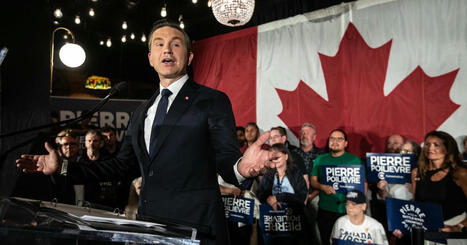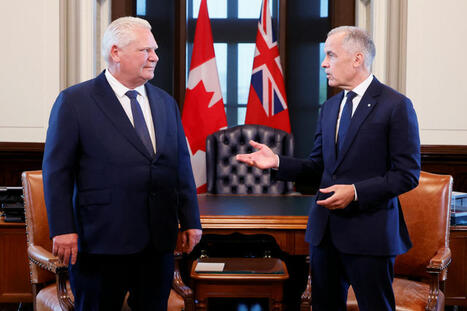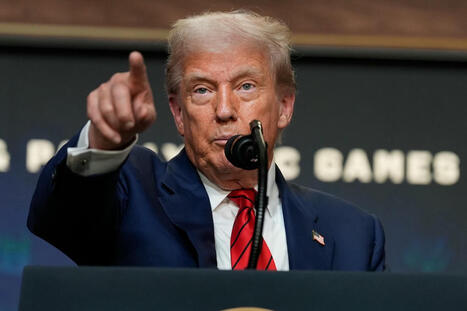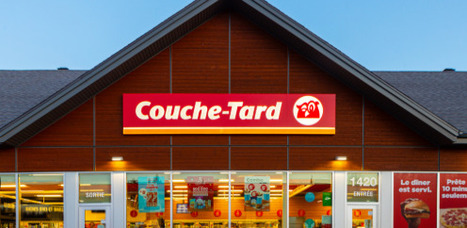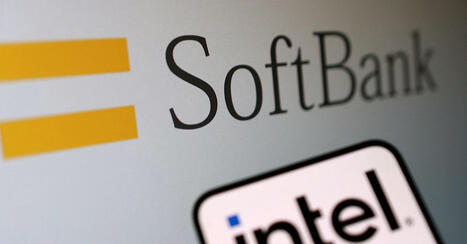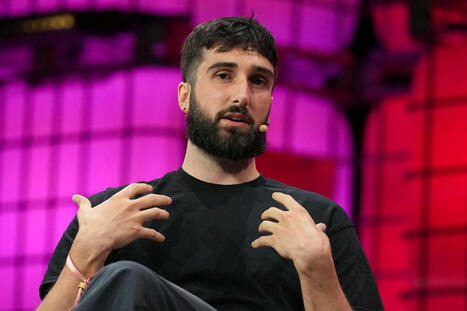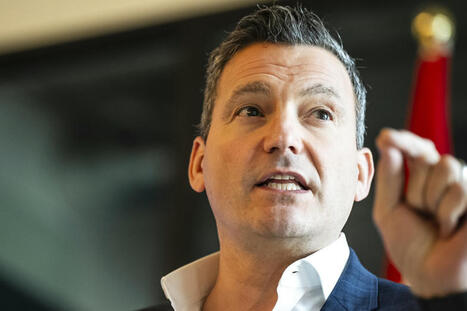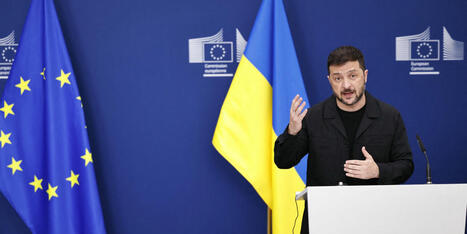 Your new post is loading...
Santos said on Tuesday the Abu Dhabi National Oil Company-led consortium will not be able to finalise its $18.7 billion bid for the Australian gas producer for at least a month, well past the exclusive due diligence deadline. Shares in Santos, Australia's second-largest independent gas producer, fell as much as 3.5% to a more than five-week low of A$7.68 as investors questioned whether the delay could kill the deal. "The market is telling you there's increased risk and uncertainty," said James Hood, Regal Funds Management's senior energy analyst. Santos shares have traded consistently well below the proposed offer of A$8.89 from the consortium led by ADNOC's international investment arm XRG on June 16, which analysts have attributed to scepticism the transaction will proceed. Exclusive talks between Santos and the consortium, which includes Abu Dhabi Development Holding Company and private equity firm Carlyle, were due to finish on Friday.
Contact lens maker Bausch + Lomb said on Monday Brett Icahn and Gary Hu have resigned from its board of directors after the termination of the agreement with billionaire investor Carl Icahn and some of his affiliates. The agreement, dated June 21, 2022, ended after the Icahn group's net long position in Bausch Health Companies, Bausch + Lomb's parent, fell below the required threshold. On Friday, Bausch Health said Paulson Capital, along with certain affiliates and managed funds, acquired about 34.7 million common shares previously held by the Icahn Group, and now owns about 19.13% of the company's outstanding common shares. The company added Brett Icahn and Steven Miller resigned from Bausch Health's board, following the termination of a separate director appointment and nomination agreement dated February 23, 2021. In April, Carl Icahn had built an economic interest covering about 34% of Bausch Health's shares.
U.S. television station owner Sinclair has made an offer to merge its broadcast TV business with smaller rival Tegna which is in advanced talks on a potential sale to Nexstar Media Group a person familiar with the talks told Reuters on Monday. Any potential merger would be difficult to close because of Sinclair and Tegna's combined debt load, the person said, asking not to be identified as the discussions are private. At the end of the second quarter, Sinclair had roughly $4.11 billion in debt while Tegna had about $2.33 billion. The Wall Street Journal, which first reported the news, said that the deal would value Tegna's shares at around $25 to $30 apiece, citing people familiar with the matter. Reuters could not immediately verify the details of the deal. Earlier this month, Sinclair said its board had authorized a strategic review of the company's broadcast business and it is considering a separation of its Ventures portfolio. Sinclair owns, operates and provides services to 178 television stations in 81 markets.
After a summer of rodeos, dinosaurs and door-knocking, Pierre Poilievre is now officially heading back to Ottawa as a Conservative member of Parliament for Alberta. The Tory leader will represent the sprawling rural riding of Battle River-Crowfoot after winning a byelection on Monday with more than 80 per cent of the vote. “Getting to know the people in this region has been the privilege of my life,” Poilievre told a crowd at a victory party in Camrose, Alta., on Monday night. “In fact, I’ve had a hell of a lot of fun.” Pierre Poilievre spent weeks this summer meeting constituents, attending events and stopping by local businesses in his new riding. It was precisely the kind of boots-on-the-ground campaign he ran in 2004 when he became an MP for the first time in the Ontario riding of Carleton. It’s also exactly the kind of local campaign he could not run in Carleton in the spring, when his leader’s tour criss-crossed the country for 36 days before holding a final rally in his home riding the night before the April 28 election.
Medtronic is making changes to its board after Elliott Investment Management became one of its largest shareholders. The activist investor and the medical-device maker have been holding friendly talks around how to boost the company’s valuation and build on ongoing plans to focus on core assets. Medtronic announced Tuesday that veteran med-tech executives John Groetelaars and Bill Jellison are joining its board as independent directors, confirming an earlier report by The Wall Street Journal. It also detailed the formation of new special committees focused on growth and operations that will include the new directors and be helmed by Medtronic Chief Executive Officer Geoff Martha. Elliott is now one of Medtronic’s biggest investors, after an engagement led by Elliott partner Marc Steinberg, the two parties said. The exact size of the firm’s previously undisclosed stake couldn’t be learned.
Canadian armoured-vehicle maker Roshel is partnering with Swedish steel producer Swebor to manufacture ballistic-grade steel in Canada, filling out the company’s production line as the country looks to bolster its domestic defence industry. The two companies signed the agreement Monday in the presence of federal Industry Minister Mélanie Joly, who is currently travelling through Stockholm, Sweden, and Helsinki, Finland, with Stephen Fuhr, the Secretary of State for Defence Procurement, to discuss industrial partnerships. Using domestic production capacity and Canadian-mined iron ore, Brampton, Ont.-based Roshel says it will utilize the expertise of Swebor to establish a new segment in the country’s steel manufacturing industry and contribute to Canada’s national defence industrial base.
Lors de leur rencontre à Ottawa lundi, le premier ministre Mark Carney et le premier ministre de l’Ontario, Doug Ford, ont mis l’accent sur la compétitivité mondiale du Canada plutôt que sur la conclusion d’un accord commercial avec les États-Unis. Les deux dirigeants se rencontraient sur la colline du Parlement, alors que les négociations commerciales avec les États-Unis ne montrent que peu de signes d’avancée. Après la rencontre de lundi, des journalistes ont interrogé M. Ford sur ses perspectives de conclusion d’un accord sans droits de douane avec les États-Unis. Il a répondu que le comportement du président américain, Donald Trump, était « imprévisible ». « Il va sortir demain une absurdité dont nous ne sommes même pas au courant, n’est-ce pas ?, a déclaré l’élu ontarien. J’ai toujours dit qu’on ne pouvait jamais prédire ce que Donald Trump allait faire, mais […] nous pouvons créer l’environnement et les conditions pour que les entreprises viennent investir ici. »
Les avions d’Air Canada devraient redécoller en soirée, mardi, à la suite d’une entente de principe entre le plus important transporteur aérien au pays et le syndicat qui représente 10 000 de ses agents de bord. Les turbulences ne sont toutefois pas terminées pour les voyageurs : le retour à la normale risque de prendre jusqu’à dix jours. « Au cours de ce processus, certains vols seront annulés […] jusqu’à ce que l’horaire soit stabilisé », souligne l’entreprise, dans un communiqué où elle confirme un accord avec ses salariés. Cette entente de principe survient après trois jours de débrayage et des négociations qui se sont déroulées dans la nuit de lundi à mardi. Selon la composante Air Canada du Syndicat canadien de la fonction publique (SCFP), l’accord est intervenu peu après 4 heures, mardi matin.
The Federal Reserve announced on Friday it was scrapping a so-called "novel activities" supervision program it created to specifically police banks on their crypto and fintech activities, and instead will integrate that work into its regular bank oversight. The Fed launched the new program in 2023 as a way to focus on how banks interact with those emerging technologies. But the central bank said it was no longer needed as the Fed has strengthened its understanding of those risks and how banksmanage them.
U.S. President Donald Trump pledged on Monday to issue an executive order to end the use of mail-in ballots and voting machines ahead of the 2026 midterm elections, a move likely to spark legal challenges by the states. “I am going to lead a movement to get rid of MAIL-IN BALLOTS, and also, while we’re at it, Highly ‘Inaccurate,’ Very Expensive, and Seriously Controversial VOTING MACHINES,” he wrote in a social media post. Trump, who has promoted the false narrative that he, not Democrat Joe Biden, won the 2020 election, has long cast doubt on the security of mail-in ballots and urged his fellow Republicans to try harder to overhaul the U.S. voting system.
The public markets are having a hard time valuing any single AI company. Putting two together then seems like an even more formidable task. That is why the tech industry is closely watching the planned acquisition of Core Scientific by CoreWeave as a sector benchmark — particularly given a sell-off in the acquirer’s share price. CoreWeave, an AI “hyperscaler” backed by the likes of Blackstone and Magnetar Capital, sells data centre computing power. It went public in March at a price of $40 per share. By June, its shares rocketed to more than $180, implying a total valuation of more than $100bn. After a weak earnings report last week, its shares drifted below $100, though still well above its IPO price. The Financial Times has reported that several top holders just also unloaded some of their CoreWeave shares after a lock-up provision had expired.
Yext's CEO Michael Walrath has proposed taking the search optimization company private in a deal valued at about $1.1 billion, it said on Monday, sending shares up 9% in early trading. Walrath, who owns 2.8% of the company's shares according to data compiled by LSEG, offered $9.00 per share in cash for the stock he does not already own — a premium of 11.2% to Friday's closing price. Walrath indicated that the proposal is backed by reputable and well-capitalized financing sources, the company said. It did not disclose the names of the funding sources. Yext's board has formed a special committee to evaluate the proposal and any strategic alternatives. There is no assurance the proposal will result in a transaction, the company said. The New York-based company also said it is withdrawing its forecast for the rest of the fiscal year 2026 in light of the proposal. The company's full-year revenue for 2025 rose 4% to $421.0 million, but its net loss jumped to $27.9 million from $2.6 million from a year ago.
Vishal Shreedhar, analyste à la Banque Nationale Marchés financiers, indique dans un récent rapport à sa clientèle qu’EG Group, une importante entreprise britannique de gestion de stations-service, explorait la possibilité de vendre ses activités américaines. Rappelons que des discussions avaient eu lieu entre elle et Couche-Tard en 2022 sur une possibilité de fusion ou d’acquisition par la firme québécoise. L’analyste estime que l’intérêt pour ces actifs pourrait renaître chez Couche-Tard maintenant que celle-ci a mis fin aux discussions avec le géant japonais Seven & i, et étant donné qu’une acquisition concentrée aux États-Unis serait plus susceptible de plaire aux investisseurs.
|
N26 co-founder Valentin Stalf is leaving his role as chief executive of Germany’s most valuable fintech and will join the group’s supervisory board, following tensions between investors and the entrepreneurs who started the business. The shake-up comes after the German financial watchdog BaFin identified concerns at the company, threatening to hit the bank with fresh sanctions last month — a move that sparked renewed tension between the co-founders and N26’s investors. It comes ahead of a possible deal between N26’s co-founders and investors in the company, which has faced several regulatory challenges. The deal would involve Stalf and his co-founder Max Tayenthal, who together own about 20 per cent of the company, waiving special voting rights that give them veto power over certain decisions in exchange for investors taking a haircut on their returns.
British healthcare real estate investor Assura said on Tuesday Ed Smith has stepped down as chairman of the board after seven years in the role and would be replaced by senior non-executive director Jonathan Davies. Smith's departure comes just a week after Primary Health Properties won a heated $2.4 billion takeover battle for Assura. Davies currently serves as the deputy CEO of restaurants operator SSP Group.
Intel is getting a $2 billion capital injection from SoftBank Group in a major vote of confidence for the troubled U.S. chipmaker in the middle of a turnaround. The equity investment, announced by the companies on Monday, is a lifeline for the once-iconic U.S. firm which has struggled to compete after years of management blunders that left it with virtually no foothold in the booming artificial intelligence chip industry. It will make SoftBank a top-10 shareholder of Intel and add to the Japanese tech investor's ambitious bet on semiconductor and AI assets that includes the $500 billion Stargate U.S. datacenter project. SoftBank also held talks with Intel on buying its contract chipmaking business ahead of the investment announcement, the Financial Times reported on Tuesday, citing multiple people with knowledge of the talks. Intel has invested billions of dollars in setting up a contract manufacturing business that has struggled to compete with Taiwan's and barely attracted external customers.
Utility company Black Hills said on Tuesday it would buy peer NorthWestern Energy for US$3.6 billion, creating a larger regulated utility with greater scale to invest in grid infrastructure and meet rising energy demand. Consolidation in the U.S. power sector has boomed, propelled by the projections of record electricity demand over the next two years amid rapid expansion of energy-intensive AI and cryptocurrency data centers, along with increased residential and commercial consumption. The all-stock deal implies a per-share value of about US$59, a premium of 7.66 per cent to NorthWestern’s last close, according to Reuters calculation. Shares of Black Hills rose 1.5 per cent in volatile premarket trading.
Peabody Energy said it has terminated its agreement to buy Anglo American’s steelmaking coal operations, a decision that comes nearly five months after a fire at an Australian mine. The British mining company had agreed to sell its steelmaking coal business-including the Moranbah North mine, where the fire broke out earlier this year-to St. Louis-based Peabody in November. Following the fire, though, Peabody said it was reviewing the roughly $3.8 billion buy. Peabody said Tuesday that the exact cause of the event remains unknown, and that there is no definitive timeline to resuming sustainable production. It terminated the purchase agreement due to what it called a material adverse change to Anglo’s steelmaking coal assets. Chief Executive Jim Grech said that the two companies couldn’t reach a revised agreement that compensated Peabody for the “material and long-term impacts” stemming from the fire at “the most significant mine in the planned acquisition.”
The federal government is working with Toronto-based AI startup Cohere Inc. to look for ways to deploy artificial intelligence across its operations. Cohere and Ottawa have signed a memorandum of understanding, or MOU, to bring AI to the public service. An MOU is not a legally binding contract, and neither party has disclosed any specific projects under way. Cohere would still have to compete for government business. But the agreement highlights Cohere’s desire to sell its tools to the public sector – and the government’s desire to use AI to boost efficiency while procuring products and services from domestic companies. Prime Minister Mark Carney has also made AI adoption a priority. “This is the beginning, hopefully, of our technology being rolled out quite broadly within the Canadian government,” Cohere co-founder and chief executive officer Aidan Gomez said in an interview Friday. Ottawa is not a substantial customer today, he said, though Cohere is working with public-sector clients elsewhere in the world.
Les présidents de la FTQ et de la CSQ craignent que des syndicats du Québec vivent bientôt le même traitement que les agents de bord d’Air Canada présentement, avec la loi que vient de faire adopter le ministre du Travail, Jean Boulet. La loi québécoise, adoptée en mai dernier, limite les effets d’une grève ou d’un lock-out. Entre autres, elle donne au ministre du Travail le pouvoir d’imposer l’arbitrage aux parties, « s’il estime qu’une grève ou un lock-out cause ou menace de causer un préjudice grave ou irréparable à la population ». Et la nouvelle loi québécoise précise qu’« une telle décision du ministre met fin à la grève ou au lock-out en cours ». Tant Magali Picard, présidente de la FTQ, qu’Éric Gingras, président de la CSQ, ont ainsi fait le parallèle avec l’arbitrage imposé aux agents de bord d’Air Canada membres du SCFP par la ministre fédérale de l’Emploi, Patty Hajdu.
Le gouvernement Carney fait appel à Cohere, spécialiste canadienne de l’intelligence artificielle (IA) qui est en pleine ascension et qui se frotte à des géants américains comme Anthropic et OpenAI, pour l’aider à déployer cette technologie à grande échelle au sein de l’appareil fédéral. La Presse a appris que le ministre de l’Intelligence artificielle, Evan Solomon, et le ministre des Travaux publics et de l’Approvisionnement, Joël Lightbound, ont signé un protocole d’entente avec Cohere. L’objectif de cette démarche : déterminer les secteurs au sein du gouvernement fédéral où l’utilisation de l’intelligence artificielle permettrait « d’améliorer les services, de renforcer les infrastructures numériques et de stimuler l’innovation dans le domaine civil et de la défense nationale ».
Nearly six months ago, Ukrainian President Volodymyr Zelensky was asked to leave the White House after a televised confrontation with President Trump over “real security guarantees” the Ukrainian leader insisted upon for any peace agreement with Russia. When Zelensky returns to the Oval Office on Monday the gap over security guarantees will have narrowed, but a chasm over Moscow’s territorial demands remains. That leaves Zelensky with a dilemma: how to sustain Trump’s support while responding to Russian territorial proposals he feels compelled to refuse. Zelensky will have some important allies accompanying him to Washington this time, including the leaders of the U.K., France, Germany, Italy, Finland and the European Union. North Atlantic Treaty Organization Secretary-General Mark Rutte, who has developed a personal rapport with Trump, will also attend.
Bidhi Bhoma has undergone a metamorphosis of late. Four years ago, the chief executive of the UK mid-market investment bank Liberum was deluged with companies paying handsomely to list on the stock market. But a sustained initial public offering drought has forced Bhoma and his troops to keep busy through providing corporate finance advice, restructuring and identifying acquisition targets for FTSE clients. “The tide has shifted,” said Bhoma, now deputy chief executive of Panmure Liberum, after his firm merged with its rival Panmure Gordon — in part because of the paucity of IPOs. “Five years ago we were skewed towards capital markets [IPO] revenue and had a chunk of advisory work . . . Now we are making more money out of advisory work.” Bhoma is not alone. Across the City of London, bankers have been forced to branch out as IPOs — once a reliable revenue stream that can keep teams of dealmakers busy for a year — dwindle.
Jared Kushner’s private equity firm has agreed to snap up an 8 per cent stake in the UK-based lender OakNorth, which is hoping to expand in the US ahead of a listing. Affinity Partners, which was set up by Donald Trump’s son-in-law after he left the White House in 2021, will purchase the stake from an unnamed existing investor, according to a person familiar with the situation. The deal, which was first reported by Sky News, is set to conclude in the coming weeks. Kushner, who advised his father-in-law on Middle East policy during his stint at the White House, has secured the backing of major investors in the Gulf through Affinity. The group manages funds on behalf of the sovereign wealth funds of Saudi Arabia and Qatar. The backing of Affinity comes as OakNorth plots a major push to expand its lending in the US.
India's market regulator on Monday proposed to reduce the minimum size of share sale for large companies looking to list their stock in a bid to simplify fund-raising. The proposal includes allowing companies to sell a minimum of 2.5% of their paid-up share capital in an initial public offering from the mandated 5% if their market capitalisation is above 5 trillion rupees ($57 billion) after the listing. The Securities and Exchange Board of India (SEBI) said that large issuers often face challenges in significantly diluting their equity through IPOs as the market might struggle to absorb such sizable offerings. That can discourage companies from opting to list in India and restrict investment opportunities for domestic investors, the regulator said. The SEBI's proposals come at a time when major initial public offerings, such as those of Reliance Jio and the National Stock Exchange of India are in the pipeline.
|




 Your new post is loading...
Your new post is loading...




